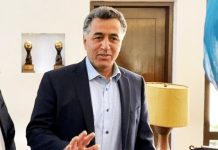From Page 1
on crime and punishment,” Dr Ayaz said, adding that the council will also review amendments to the law. Last month, through a presidential ordinance, the Pakistan Tehreek-i-Insaf government made drastic changes in the country’s accountability law. After smooth sailing of the three key bills on the tenure of the services chiefs through the parliament, the government and the opposition on Wednesday agreed to discuss and build consensus for legislation on other important matters including the powers of NAB. As a first step to shun their differences causing delays in the legislation process, teams of the government and main opposition sat together yesterday for the first time in the chamber of National Assembly Speaker Asad Qaisar in the parliament house to forge consensus on five different bills including the National Accountability [second amendment] Ordinance, 2019. In addition to discussing the NAB law, the CII during its two-day meeting, also presented its recommendations for the prevention of sexual violence against children. The CII suggested that a special court be formed to look at such incidents. The CII also termed forced conversions as un-Islamic and unconstitutional. Shortly after Dr Ayaz’s press conference, Federal Minister for Science and Technology Fawad Chaudhry took to Twitter to express “serious concerns” about the CII’s performance. “Till today the religious segments [of the country] have not received any guidance from the ideological council,” he said, adding that he could not understand the logic behind spending millions of rupees on such an institution. In response to the federal minister’s remarks, Dr Ayaz said Chaudhry’s tweet was beyond his comprehension, adding that the government, Supreme Court and a high court had all expressed dissatisfaction with the NAB law. “We have reviewed the NAB law from the perspective of the Shariah,” he added. The Council of Islamic Ideology (CII) on Thursday declared several clauses of the NAB Ordinance and the corruption watchdog’s practice of handcuffing the accused as well as the accused’s media projection against Shariah. Briefing the media after a two-day meeting in Islamabad, Chairman Dr Qibla Ayaz said that sections 14-D, 15-A and 26-A of the National Accountability Bureau’s ordinance were in violation of Islamic laws. Section 14-D of the ordinance states that the burden of proof “shall lie with the accused”, whereas Section 15-A says that a convicted person “shall cease to hold public office” and “stand disqualified for a period of ten years” from holding a public office. Meanwhile, Section 26 empowers the NAB chairman to grant pardon under a plea bargain deal. The CII chairman said that detaining, handcuffing and parading the accused in front of the media “is un- Islamic”. The religious scholars also recommended the legislation of strict laws and establishment of separate courts to prevent child abuse. Furthermore, the CII suggested a ban on uploading blasphemous content on social media and endorsed National Assembly’s resolution in this regard. Fawad questions CII role Minister for Science Fawad Chaudhry questioned the performance of the religious body, which is responsible for reviewing the laws in the light of Islamic principles. “Spending millions of rupees on it is beyond my understanding. CII needs restructuring and people who are highly qualified. [People] aware of latest trends should be tasked with running it.” In its meeting on Wednesday, the CII took up the matter of forced conversions of religion and decided to include minority leaders in the consultation process, sources said. They were of the view that Islam does not allow forced conversions. It was also proposed to the Ministry of Religious Affairs to prepare a performa for those who want to change their religion or accept Islam. Assembly, 68 of Khyber- Pakhtukhwa Assembly and 25 of Balochistan Assembly. According to ECP, top political leaders, federal and provincial ministers and constitutional office holders are among those who failed to meet their legal obligation. They include Punjab Chief Minister Usman Buzdar, Pervez Khattak, Raja Pervaiz Ashraf, Faisal Vawda, Tariq Bashir Cheema, Khurram Dastagir, Musadaq Malik, Mir Hasil Bizenjo, Mian Mehmoodur Rasheed, Sardar Yar Mohammad Rind, Sharjeel Memon and Sanaullah Zehri. decisions, that they had already quit the LeT before the organisation was proscribed in 2002. They argued that the cases against them had been registered on the basis of a link to the defunct Al-Nifal Trust which, they claim, was formed to construct mosques in the country. They said the CTD registered cases without any substantive evidence. On July 3, 2019, the top 13 leaders of the JuD were booked in nearly two dozen cases pertaining to terror financing and money laundering under the Anti-Terrorism Act (ATA), 1997. The CTD, which registered the cases in five cities of Punjab, declared that the JuD was financing terrorism from the massive funds collected through non-profit organisations and trusts, including Al-Anfaal Trust, DawatulIrshad Trust, Muaz Bin Jabal Trust, etc. These non-profit organisations were banned in April as the CTD, during detailed investigations, found that they had links with the JuD and its top leadership. Subsequently, on July 17, 2019, Saeed was arrested from Gujranwala on charges of terror financing by the Punjab CTD. He was sent to prison on judicial remand after the CTD presented him before a Gujranwala ATC. In February 2019, the Paris-based Financial Action Task Force (FATF) had warned Pakistan to deliver on its commitments to curb terror financing and money laundering. Risks to the global financial system virtually put the country’s entire machinery into an aggressive mode to show tangible progress within two months of the warning. In late February 2019, the government announced a ban on JuD and Falah-e- Insaniyat Foundation to partially address the concerns raised by India that Pakistan supported these and six similar organisations, including Jaish-e-Mohammad (JeM), or at least considered them low-risk entities. Law enforcement agencies over the next few weeks intensified their crackdown on JeM, JuD, FIF and other banned outfits, and arrested more than 100 activists. Nearly 200 seminaries besides hundreds of other facilities and assets associated with them across the country were taken over by the government. Quarterly assessments by the FATF of Pakistan’s progress continued over the course of the year. In the latest FATF review held in October, it was found that while Pakistan has made significant improvements, it will have to take “extra measures” for “complete” elimination of terror financing and money laundering. A reprieve until February 2020 has been given until when Pakistan will remain on the task force’s “grey list”. In 2012, Pakistan was placed on the grey list and remained on it till 2015. The country was put on the list again on June 29, 2018. Pakistan was given 15 months for implementation of the 27-point action plan, with a warning that in case of failure the country would be added to the blacklist — a list of the countries branded as uncooperative and tax havens for terror funding. Currently, only Iran and North Korea are on the blacklist. Zafar Mahmood Abbasi had a meeting with Deputy Commander PLA Southern Theatre Command Vice Admiral Dong Jun where matters of mutual interest came under discussion. During meeting, the Naval Chief highlighted that exercise Sea Guardians is a manifestation of treasured friendship and mutual trust that exists between the two countries and the ongoing exercise will carry forward our relationship to new heights of glory. He further said that the exercise is aimed at not only countering maritime threats together but also solidifying the common resolve of both the navies of ensuring regional peace and security. Admiral Zafar Mahmood Abbasi further expressed his hope that regular conduct of such exercises would further enhance the cooperation and interoperability between the two navies. Later, Chief of the Naval Staff also interacted with the PLA (Navy) ship’s crew and appreciated their professional competence and morale. Deputy Commander PLA Southern Theatre Command Vice Admiral Dong Jun thanked Naval Chief for his visit onboard PLA (Navy) Ship. Bilateral joint Naval exercise ‘Sea Guardians’ is conducted between Pakistan and PLA Navies. Exercise Sea Guardians 2020, the sixth in the series, covers a wide spectrum of maritime and naval operations by Ships, aerial platforms and Marine forces. Nangarhar: Afghan security force members taking part in a military operation in Momandara district of Nangarhar Province, Afghanistan, here on Thursday.–Agencies



